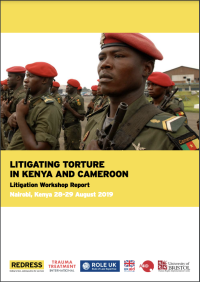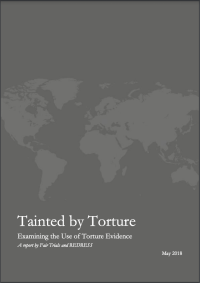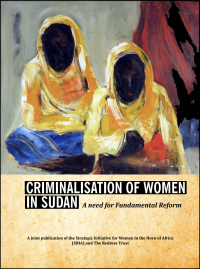Publications
REDRESS’ publications are also available in hard copy format. Please contact us for further information on [email protected].
In this letter, submitted ahead of the 42nd regular session of the UN Human Rights Council, REDRESS and other civil society organisations urge the Council to take action to address serious human rights violations and abuses that have been and continue to be committed in Sudan, and to support systemic reforms in the country.
This is a report of a Litigation Workshop that took place in Nairobi on 28-29 August 2019 involving lawyers and medical professionals from Kenya and Cameroon and the Gambia, led by REDRESS with the involvement of Trauma Centre International, the Independent-Medico-Legal Unit, the Human Rights Implementation Centre within the Law School of the University of Bristol, and Three Crowns. The workshop was designed to look in particular at the strategies and tactics for implementing judgments, and utilizing a collaborative approach between medical and legal professionals to seek justice for victims of torture.
REDRESS and the African Centre for Justice and Peace Studies (ACJPS) have issued this briefing which identifies priority areas for reform on torture in Sudan following the recent removal of Omar al-Bashir as President. It focuses on reparations for victims of torture, ensuring individual accountability and preventing torture in the future.
This report, written by REDRESS and Fair Trials, reveals that state authorities continue to rely routinely on evidence obtained through torture in criminal cases by looking at the law and practice in 17 countries from Europe, Asia-Pacific, Africa and the Americas.
This submission to the Universal Periodic Review of Chad, presented by REDRESS, the Chadian Association for the Promotion and Defence of Human Rights and Human Rights Watch, focuses on one issue: the Chadian government’s failure to make reparations to victims of Hissène Habré-era abuses despite its legal obligations and a 2015 decision by a Chadian court ordering it to provide compensation to over 7,000 victims.
The report, ‘Criminalisation of Women in Sudan: A Need for Fundamental Reform’, shows how public order laws, designed to protect morality, continue to disproportionately target women, who can face long spells in jail and flogging for infractions such as wearing ‘trousers’. Focusing on Khartoum state, the reports describes the experiences of some of the women most affected by the application of these laws, including alcohol brewers and sellers, human rights defenders, female students and migrant women. The report was written by the Strategic Initiative for Women in the Horn of Africa (SIHA) and REDRESS.
Les parties civiles devant la Cour Pénale Spéciale (« CPS ») sont victimes de violations graves du droit international. Par conséquent, les réparations symboliques ou morales, à elles seules, ne sont pas suffisantes pour remédier au préjudice subi. Le Règlement de procédure et preuve («RPP ») risquerait d’être en contradiction avec le CPP centrafricain et en violation des obligations internationales de la République Centrafricaine s'il devait restreindre la portée des réparations qui seraient appropriées pour réparer le préjudice subis par les parties civiles. Il est primordial que le RPP fournisse un cadre juridique pour que les victimes obtiennent réparation et que ce cadre soit conforme au droit international et réponde aux droits et attentes des victimes.
This report, co-authored by REDRESS and Avocats Sans Frontières (ASF), summarises the proceedings of a workshop on victim and witness protection at the International Crimes Division (ICD), the first domestic court in Uganda to try international crimes. Participants included ICD judges, registrar, prosecutors, and victims’ counsel, alongside national and international experts, who discussed which measures can be put in place to ensure the safety and well-being of victims and witnesses throughout the process despite the lack of protection laws and national protection mechanism.



